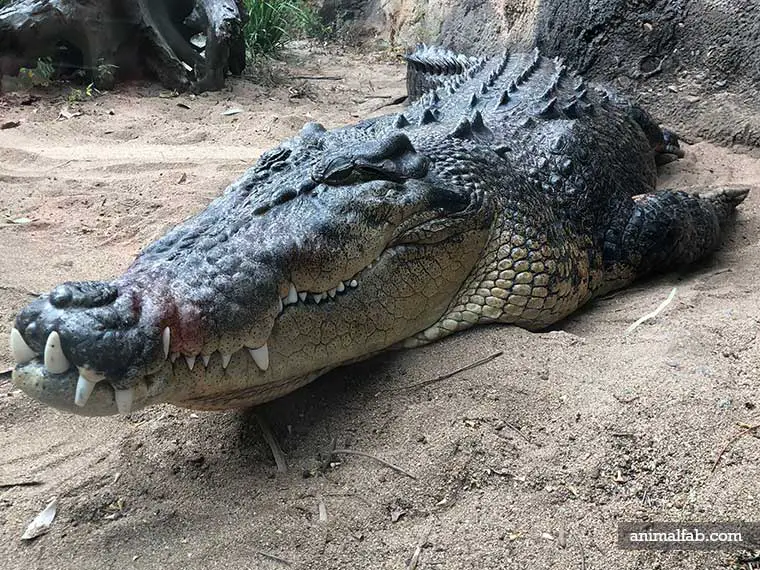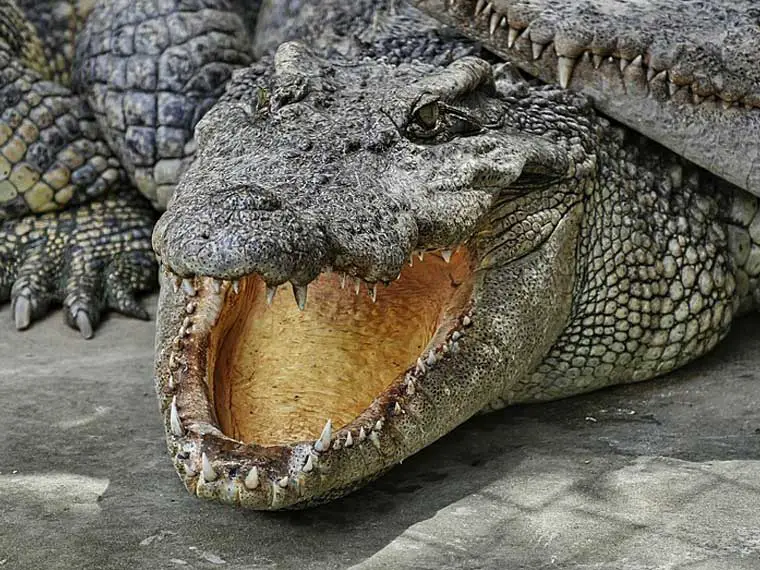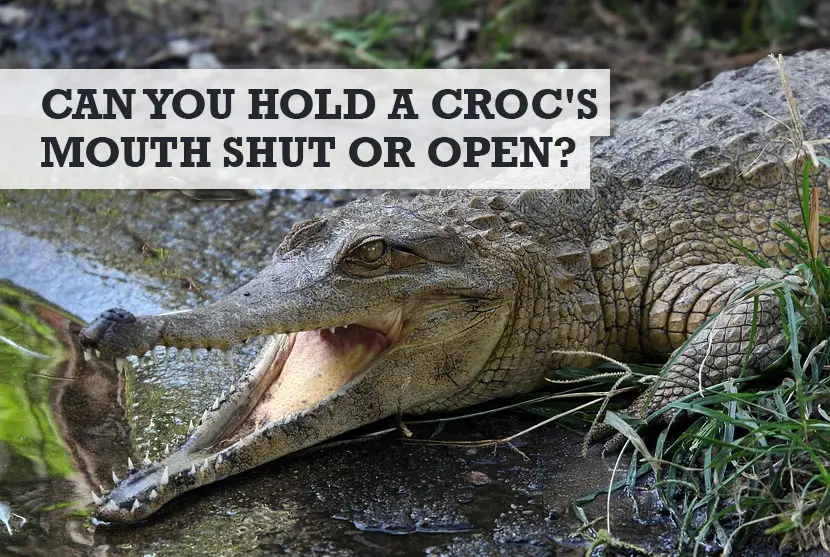Alligators and crocodiles are intimidating creatures. The speed at which they can snap their jaws shut is frightening. If you were to be attacked by a reptile like this, what do you think the chances are of you either holding their mouth shut, or holding it open?
Well, I’ve done the research for you, and seen what the experts say, so without further ado, here’s all you need to know about holding a crocodile’s mouth open (or shut).
Can you hold a crocodile’s mouth shut? Yes, humans can hold a crocodile mouth shut. The muscles that open a crocodile or alligator’s jaws are weak in comparison to the ones used to close their jaws.
So, based on that very short answer, it is indeed possible for you to hold an alligator’s mouth shut. You can easily hold a crocodile’s mouth shut providing you can get into the right position to do so.
What I mean by that, is that crocodiles and alligators are very good at rolling and thrashing. If you did try to hold an alligator’s mouth shut, you would actually find it very hard in reality.
The animal will struggle and is strong enough to knock you off, making you release your grip from the jaws. Once you do that, game is on, and you become the hunted.
So, given what we now know about the difference in muscles in the reptilian jaw, how does that work if you want to do the opposite? In other words, try opening a crocodile’s mouth.

Can you hold a crocodile’s mouth open?
This is where the difference in muscle power occurs. Like all animals, the jaws of crocodiles and alligators have evolved to be stronger on the bite down. That means the muscles for chomping down are far stronger than those for opening.
In simple terms, you will find it very hard to hold an adult crocodile or alligator’s mouth open, because their instinct and strength will be all about the close. There’s a lot of power and PSI strength in their bite which I will explain further down.
Can you hold a crocodile mouth shut with a rubber band?
Given that we know that the muscles that open crocodiles or alligators’ jaws are so much weaker than the muscles that work their mouths shut, you might be wondereding about the myth of the rubber band.
If you’ve not heard it, there’s a common question when discussions like this occur: can you hold an alligator’s mouth shut with a rubber band?
Well, yes, in theory you can hold a crocodile or alligator’s mouth shut with a rubber band or your bare hands.
Do I recommend it?
No, of course not!
But the consensus is that due to this weakness in the opening muscles, their mouths can be held shut comparatively easily by most people. That means a rubber band could be strong enough to keep most crocodilian’s mouths shut without it snapping.
But the reality of what happens in real life is very different.
Those that catch crocodiles when they get into human environments would never use a rubber band to secure the mouth shut. The experts will use a variety of stronger materials, such as tape and rope to keep crocodile’s mouths secured.
In general, using a rubber band could also be dangerous as it could come loose or break if the crocodile thrashes around or struggles while being restrained.
Handy Hint: Have you ever wondered why crocodiles rest with their mouths wide open like that?
How strong are a crocodile’s jaws?
Ever wondered what the bite force of a crocodile is in pounds per square inch? Well, according to my research, crocodiles have the strongest bite ever recorded in the animal world.
The National Geographic, the bite force of a large adult crocodile could rival that of the long-extinct dinosaur, the T-Rex. Although a fully grown adult might be able to hold a crocodile’s mouth shut, they would struggle to pry its mouth open after it’s clamped down on something.
This is because crocodile jaws are designed to stay firmly shut so they can perform their signature death roll – a spinning maneuver used to critically injure or kill their prey.
National Geographic found that in average, saltwater crocodiles have a bite force of around 3,700 pounds per inch (psi) or 16460 newtons. To put that in perspective, a hyena, another animal famous for its incredibly strong jaws, only has a bite force of around 1,100 psi.
Similarly, big cats such as lions and tigers only record a psi of 650 and 1,050 respectively.
Handy Hint: Did you know that crocodiles have been known to jump out of water and into boats!
How strong are an alligator’s jaws?
Florida State University also published a study which found that Australian saltwater crocodiles are world’s most powerful biters.
Marine biologists have been pondering a particularly painful-sounding question: How hard do alligators and crocodiles bite? The answer is a bite force value of 3,700 pounds for a 17-foot saltwater crocodile (as well as tooth pressures of 350,000 pounds per square inch). That’s the highest bite force ever recorded.
But overall, compared to crocodiles, most species of alligator have a much weaker bite strength at around 2,125 pounds per inch. They still do have the sixth strongest bite on the planet and are obviously not to be trifled with – you would not try to keep their mouth open and stand a chance.

For example, crocodiles have been observed biting through materials as strong as steel and iron without damaging their jaws or breaking their teeth.
Much the same as with crocodiles, humans stand almost zero chance of opening an alligator’s mouth when it is completely closed. However, the average adult human would have no issue keeping a crocodile’s mouth pinned down with their hands.
Did You Know? Alligators and crocodiles can’t mate with each other.
Why do crocodiles and alligators have such a strong bite?
According to research carried out by scientists at the University of Missouri, crocodiles and alligators can bite with such extreme force because they have a second joint located in their jaws.
This joint allows them to distribute force throughout their bite and prevents them from losing their grip whenever they twist or thrash when latched onto their prey.
Unlike other animals, crocodiles and alligators lack the ability to chew and instead must tear chunks from their prey using this method.
Interestingly, this joint also bears some similarities to the joints found in humans and other mammals and could indicate that crocodiles have evolved more than we previously thought.
More on crocodiles and alligators
Below I’ve provided some extra information on crocodiles and alligators that you might find interesting.
What is the difference between an alligator and a crocodile?
Knowing the differences between crocodiles and alligators can be useful, especially if you ever find yourself in a situation where you need to restrain one. Although both species belong to the same taxonomic order (Crocodylia), they are not the same animal contrary to what some believe.
Crocodiles and alligators do share many similarities, however, there are several surefire methods to tell them apart.
Firstly, alligators have a noticeable overbite, and their teeth are only visible at the bottom of their jaw. In comparison, crocodile’s teeth slot into grooves, and both their bottom and upper teeth are always visible.
Handy Hint: Click here to read more amazing crocodile teeth facts!
Additionally, alligators have rounded snouts shaped like the letter U, while crocodile snouts resemble more of a v shape.
What does it mean when a crocodile or alligator’s mouth is open?
The chances are, you’ve probably watched a nature documentary before and seen a crocodile or alligator resting on a bank with its mouth wide open.
Although it might look like a threatening display, this behavior is solely centered around allowing them to cool down or avoid overheating and is not a warning.
However, they may also open their mouth to allow birds such as the Egyptian Plover to remove pieces of meat lodged in their teeth.
Alligator bite statistics in Florida
Florida is one place where you might encounter these beasts, but hopefully not have to hold their mouths shut. Thankfully this type of experience would be rare.
According to Enjuris:
The chance of someone being attacked is one in 3.2 million. The worst years for fatalities were 2001 and 2006, with three people dying each of those years from Florida alligator attacks. And there have only been 23 fatalities between 1948 and 2016.
Conclusion
Some years ago, I went on vacation to South Florida with a few family friends and we all took a trip to the Everglades National Park to see how many different species of animals and birds we could see.
Needless to say, we soon spotted alligators (from the safety of the boat!) and this got me thinking about this question originally of whether a human hold a crocodile’s mouth shut if they were attacked?
Thankfully, I never had to find out on the way, so glad I could get back to do the research from the safety of my own home.
You might also like…
- Where do crocodiles like to sleep?
- Is it possible to train and tame a crocodile
- Can crocodiles jump up high when on land?
Image in header via https://pixabay.com/photos/crocodile-open-mouthed-reptile-wild-412673/

